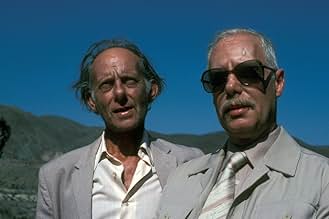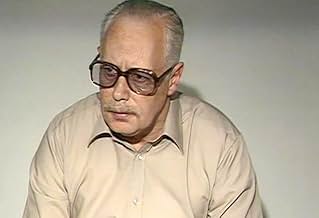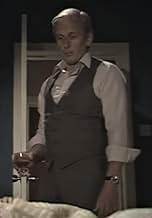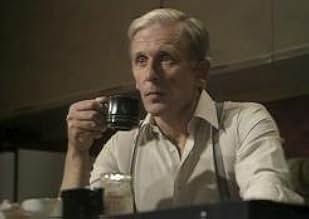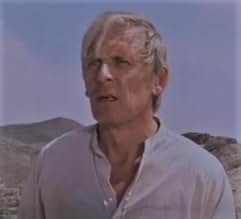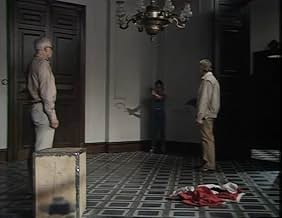Ajouter une intrigue dans votre langueAfter WWII, ex-Gestapo officer Kessler flees as a war criminal, escaping with wealth to Paraguay to start anew as a businessman. He dreams of fascism's return while former Lifeline members h... Tout lireAfter WWII, ex-Gestapo officer Kessler flees as a war criminal, escaping with wealth to Paraguay to start anew as a businessman. He dreams of fascism's return while former Lifeline members hunt him.After WWII, ex-Gestapo officer Kessler flees as a war criminal, escaping with wealth to Paraguay to start anew as a businessman. He dreams of fascism's return while former Lifeline members hunt him.
Parcourir les épisodes
Avis à la une
The first episode of the "Kessler" mini series is a re-worked version of the (unbroadcast) final episode of "Secret Army" (1977-79), "What Did You Do In the War Daddy?", which the BBC management had refused to broadcast in 1979.
As such, the first episode features the surviving cast of "Secret Army" - Albert, Monique and Natalie. This is great, but they only appear in the first episode (which sets up this series).
Overall, "Kessler" was disappointing. It didn't have the strong dramatic tensions which had made "Secret Army" such a success. Removed from his Gestapo post, and on the run, Kessler was no longer the sinister menace that had given the character such strength in "Secret Army".
And it was, of course, impossible to present the character sympathetically. This was a serious drawback to the series. The main character must have the audience's sympathy if we are to care what happens to him.
"Secret Army" had very successfully characterised its two Luftwaffe officers - Major Brandt and Major Rienhardt - sympathetically, by their contrast to the evil Kessler. But it was impossible for the writers to do anything with Kessler himself other than demonise the character. This seriously undermined the "Kessler" series, as there was never any chance for the audience to like the lead character.
The presence of the well-loved Resistance heroes of "Secret Army" might yet have saved the day. But that was made impossible by the decision to set the sequel mainly in South America, and to give it a completely new cast (for all but the first episode). Only Kessler himself continued from "Secret Army".
I was particularly surprised by the absence of Madelaine (Hazel McBride), Kessler's only friend in the earlier series, who might have stood at least some chance of showing up a human side to him.
As such, the first episode features the surviving cast of "Secret Army" - Albert, Monique and Natalie. This is great, but they only appear in the first episode (which sets up this series).
Overall, "Kessler" was disappointing. It didn't have the strong dramatic tensions which had made "Secret Army" such a success. Removed from his Gestapo post, and on the run, Kessler was no longer the sinister menace that had given the character such strength in "Secret Army".
And it was, of course, impossible to present the character sympathetically. This was a serious drawback to the series. The main character must have the audience's sympathy if we are to care what happens to him.
"Secret Army" had very successfully characterised its two Luftwaffe officers - Major Brandt and Major Rienhardt - sympathetically, by their contrast to the evil Kessler. But it was impossible for the writers to do anything with Kessler himself other than demonise the character. This seriously undermined the "Kessler" series, as there was never any chance for the audience to like the lead character.
The presence of the well-loved Resistance heroes of "Secret Army" might yet have saved the day. But that was made impossible by the decision to set the sequel mainly in South America, and to give it a completely new cast (for all but the first episode). Only Kessler himself continued from "Secret Army".
I was particularly surprised by the absence of Madelaine (Hazel McBride), Kessler's only friend in the earlier series, who might have stood at least some chance of showing up a human side to him.
Not really a sequel to Secret Army, despite the brief appearances of Monique, Albert and Natalie, all of whom are wasted in the first episode. Hopes are raised that they will have a major part to play but these are soon dashed. Kessler himself seems less menacing if still unsympathetic but suffers from the lack of interplay and rivalry with his Luftwaffe counterparts. His rise in the Nazi hierarchy is unconvincing. He still has a pretty boy assistant now in a three piece suit rather than SS uniform though Franz is nastier, more ambitious and devious than his two predecessors. Kessler's daughter Ingrid does not have the humanising effect of her mother Madeleine but is a caricature of a neo Nazi madchen. The Nazi hunters lack depth and the ageing Nazis are stereotypes. The pace, characterisation, dramatic structure, tension and atmosphere are all inferior to Secret Army. All told a disappointment unworthy of its inspiration, it would have been better if there were no link with Secret Army.
The creators of this series originally intended to set it in an earlier decade - the 1960's - but the BBC objected on the grounds that this would cost more than a contemporary setting. The writers were told that it was deemed too expensive to hire 'period-appropriate' clothes, cars, props and locations; when they pointed out that the Kessler character would be quite ancient by the dawn of the 1980's (not to mention further removed from the events of "Secret Army"), the BBC executives apparently replied:"who cares, nobody will notice". Thus the cast and those behind the camera began the project with legitimate misgivings.
In "Secret Army", Kessler had a romantic relationship which made the character three dimensional and showed that even a cruel Nazi bigot had human dimensions. At the time, some people at the BBC felt that this factor might inspire too much sympathy for Kessler. Perhaps the Corporation's fear of the SS man being hero-worshipped explains why his loving companion makes no appearance in the subsequent series?
In "Secret Army", Kessler had a romantic relationship which made the character three dimensional and showed that even a cruel Nazi bigot had human dimensions. At the time, some people at the BBC felt that this factor might inspire too much sympathy for Kessler. Perhaps the Corporation's fear of the SS man being hero-worshipped explains why his loving companion makes no appearance in the subsequent series?
Difficult to watch. This is an overdrawn Boys of Brazil. With similarly thick accents. The plot is not gripping at all. The Israeli girl a poor actress. The show grows preachy (European country do so little to catch the war criminals that we are told with a straight Israel must do the job, the whol hit squad being a petite Sephardic woman), the Fourth Reich business was already laughable in 1981. The show is slow, hardly believable, the characters are hard to like, the "nostalgic" bits too frequent. Pass you way. Just watch the Secret Army, a far more subtle series (especially in its second and third seasons).
I remember watching this when it was first shown on the BBC. It takes the story on, post-war, of what becomes of Gestapo chief Kessler. Hopefully UK Drama will show this - as they are now showing Secret Army.
All the superlatives about Secret Army apply equally to this. It may be a cliche, but drama like this makes the BBC license fee worthwhile!
All the superlatives about Secret Army apply equally to this. It may be a cliche, but drama like this makes the BBC license fee worthwhile!
Le saviez-vous
- AnecdotesThe serial incorporates several elements of What Did You Do in the War, Daddy? (1979), the never aired final episode of Secret Army (1977) which was also written by John Brason: Kessler married his Belgian mistress Madeleine Duclos, who has since died, and has established himself as a major industrialist in West Germany under the pseudonym Manfred Dorf, Monique has a son in his twenties and returns to Brussels for the first time since the end of the war, Albert still owns the Candide in addition to six other restaurants and the surviving members of Lifeline reunite for the purposes of a documentary series entitled "In Our Time" which attempts to expose Kessler as a Nazi war criminal.
- Crédits fousThe opening titles start by displaying the letters SS which change to the name Kessler.
- ConnexionsFollows Secret Army (1977)
Meilleurs choix
Connectez-vous pour évaluer et suivre la liste de favoris afin de recevoir des recommandations personnalisées
- How many seasons does Kessler have?Alimenté par Alexa
Détails
Contribuer à cette page
Suggérer une modification ou ajouter du contenu manquant

